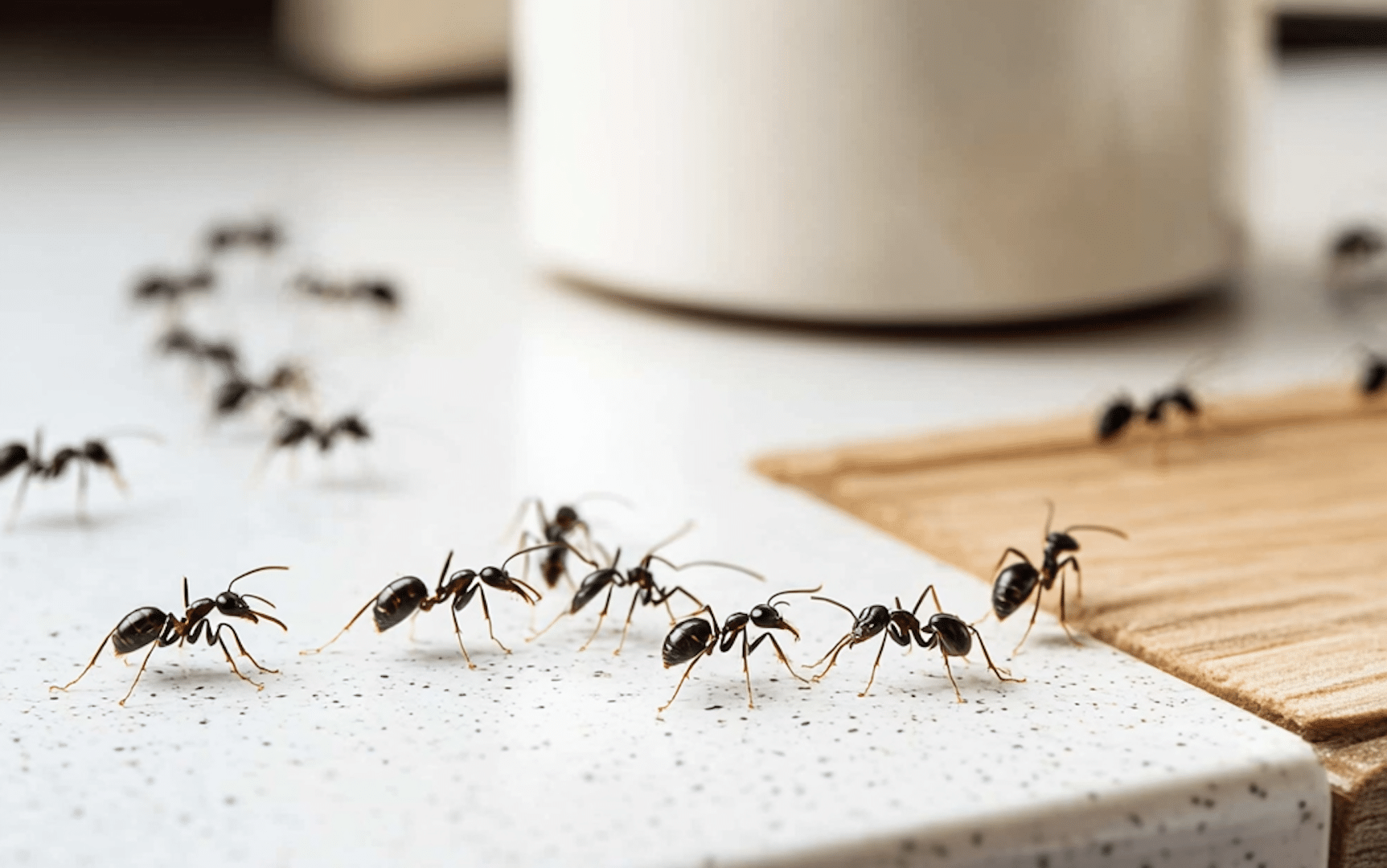The kitchen is often referred to as the heart of the home, serving as more than a place to eat – it’s also the gathering place within the home.
Unfortunately, your kitchen isn’t an exclusive gathering place for you and your family, and often attracts unwanted pests like ants, cockroaches, spiders, and more.
As the weather warms across Eastern Pennsylvania, it’s common to find ants in your kitchen, as even the cleanest homes suffer from ants occasionally.
Depending on where you live, whether it’s the Lehigh Valley, Southern Pennsylvania, or Northeastern Pennsylvania, you’re bound to encounter a variety of different ant species, including acrobat ants, carpenter ants, sugar ants, and more.
If you’re tired of ants disrupting your kitchen and peace of mind, this guide will help you get rid of ants in the kitchen once and for all.

1. Identify What Ant You’re Dealing With
Before you can effectively treat an ant problem, it’s important to know which species has moved into your kitchen.
Different ant species have distinct nesting habits, food preferences, and treatment solutions. Pennsylvania is home to a variety of ant species, and some are more likely to invade your kitchen than others. Here are a few of the most common ants you’re likely to encounter in Eastern Pennsylvania:
- Odorous House Ants – Small, dark brown or black ants that give off a rotten, sweet smell (like coconut) when crushed. Often found trailing along countertops and sinks.
- Pavement Ants – Small, dark brown to black ants commonly found near foundations, patios, and sidewalks, often sneaking inside in search of food.
- Acrobat Ants – Small, light brown to black ants known for raising their heart-shaped abdomen over their head when threatened.
Other ant species, like the carpenter ant, can be found inside kitchens, but are mostly attracted to soft woods and tend to stay outside.
Identifying the proper ant species will help you locate their nest, understand their habits, and select the most effective control method, whether it involves applying a liquid bait, spray, or trap.
2. Find the Source of the Ant Infestation
If you do discover some tiny, segmented invaders in your pantry or kitchen, the first thing you should do is determine how they got in. Inspect areas where ants are frequently observed or likely to be found.
Watch where they go and try to see where these little pests are coming from. Some common areas you will find ants include damp areas, like under sinks. Soft, spongy areas beneath plumbing or leaks can be a draw.
Check the framing and flooring, especially around windows, doors, and vents, for entry points. Other areas besides kitchens that ants frequent include attics, bathrooms, and walls.
Conduct some reconnaissance and identify the entry points of these pests, allowing you to seal any potential openings.
3. Erase Ant Trails
Maybe you’ve only spotted one ant. Well, be wary; a single ant is usually sent out to scout.
Stop them from casing the place by shutting down the scout teams. Ants typically leave behind a trail for other ants to follow. To put an end to this, you will need to create a solution to completely erase it.
Creating a homemade solution is simple. Mix one part vinegar with three parts water, and you have a safe and non-toxic way to eliminate ant trails.
Of course, you can opt for a store-bought spray, but be cautious, as these often contain hazardous chemicals that can be harmful to anyone or any animal residing in the home.
4. Apply Liquid Baits and Traps
Unfortunately, it may be too late to cut off the scout team. Don’t worry; there are other methods you can use to stop them. One easy solution is to use baits and traps.
These over-the-counter killers are usually sold in small containers that you can place just about anywhere. Since they are sealed, they are less dangerous than sprays. However, it’s a good idea to keep them out of reach of animals and children.
You can stick these little traps wherever you see activity:
- Cabinets
- Countertops
- Sinks
- Under the stove
- Drains
- Pipes and cables
If you are using traps, the ants will go inside and won’t come back out. If you’re trying out the bait, resist the urge to squash it. Ants will take the bait back to their colonies and destroy it from within. Either method can be effective in permanently eliminating these pests.
5. Keep Your Kitchen Clean
When ants work their way inside your home, they are on the lookout for two things: food and water. The best thing you can do is make sure they aren’t robbing your pantry blind.
After meals and cooking, clean things as thoroughly as possible. Wipe down counters and floors, and wash dishes regularly.
Store your food, including pet food, in sealed containers. Try not to leave any uneaten food out and keep meals contained in one or two rooms. If you cut off their food source, the ants will look elsewhere for their free meals.
6. Seal Off Entry Points to Your Kitchen
The best way to get rid of ants in your home is to stop them from getting inside at all. Seal any possible openings, even if they are small. Ants can easily slip through cracks and broken seams.
Ensure your windows seal properly, your vents are properly covered, and any cracks are sealed. Regular maintenance on your home should help keep ants and other pests out of your kitchen and other parts.
7. Call a Professional
Don’t let ants ruin this season. Use these tips and tricks to prevent these pests from entering and to deter them from staying.
If you suspect you may have an ant problem that is more than you can handle, don’t hesitate to contact a pest control expert for a quick and easy inspection.
The Pest Rangers even offer Home Protection Plans that can help keep out ants and other pests from your home with little effort on your part. Contact us today for a free quote and to learn more.
FAQs
Why do ants suddenly appear in my house?
Ants typically enter homes in search of food, water, and shelter. Seasonal changes, especially in spring and summer, often trigger ant activity. If they find a reliable food source or easy entry points, they’ll return and alert the colony.
Are ant traps or sprays better for eliminating ants?
Both can be effective, but application is key. Traps and bait are often more efficient for long-term control. Bait allows ants to carry poison back to the colony, eliminating the source. Sprays work best for immediate results on visible ants, but do very little for long-term control.
Can ants cause damage to my home?
Some ant species, like carpenter ants, can cause structural damage by hollowing out wood for nesting. While most ants are more of a nuisance than a threat, ignoring an infestation can sometimes lead to larger problems.




























